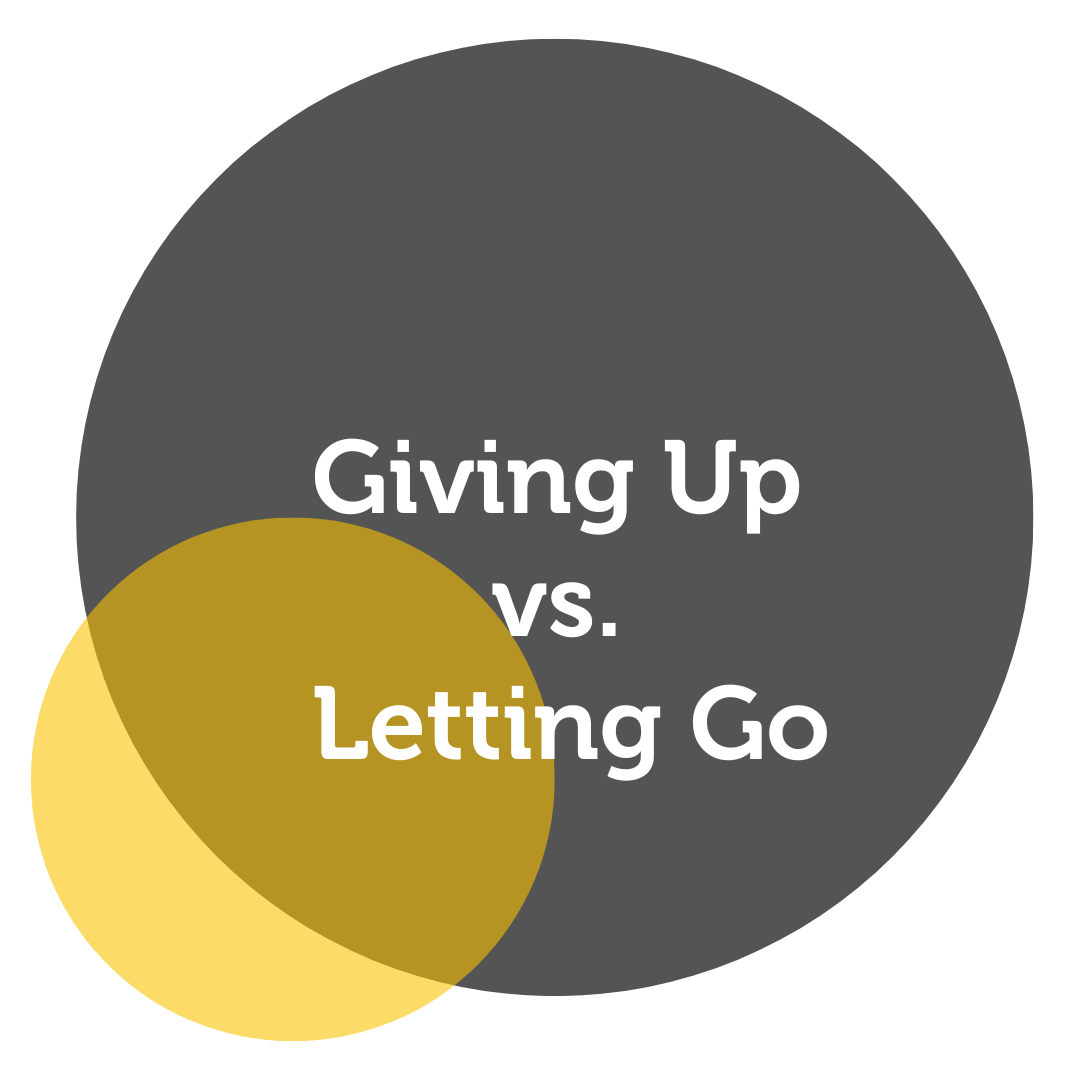A Coaching Power Tool By Joshua Schwarzberg, Mindset Coach, UNITED STATES
Giving up vs. Letting Go: A Power Tool
Many years ago I started my very first business. It was a bespoke cocktail catering company with all the razzle-dazzle you could ever want for your private event. Countless hours were spent perfecting the brand identity and product. Days were spent scouring catalogs for glassware and bar tools. Months were spent creating a marketing strategy to bolster our advertising budget. On the outside, the company I had created was perfect, but on the inside, I was drained, unfulfilled, and directionless. About two years in, I had the urge to throw in the towel. Suddenly, a little voice popped into my head and said, “You don’t give up. You aren’t a quitter. Keep going!” I continued to listen to this little voice until it was all I knew. Don’t give up. You aren’t a quitter. Keep going!
For the next two years, I went on like this- absolutely miserable but not giving an inch. I was fully dedicated to the success of this company. After all, in the words of Vince Lombardi, “Winners never quit and quitters never win”. As fate would have it, I drove myself into the ground and ended up folding my company. I felt so disappointed and ashamed, but the misery of the grind had become too much and I finally caved. My desire to succeed eclipsed my ability to be authentic. It was in this moment of “failure” however, that I began to discover the difference between Giving Up and Letting Go. “Giving up” means abandoning a goal or task, usually out of frustration or a belief that it cannot be achieved. “Letting go” means to release attachment to something or someone, for the purpose of moving on or finding peace. Giving up implies a sense of defeat while letting go implies a sense of acceptance and a willingness to move forward. At some point or another, everyone will experience a situation similar to this one. Do we press forward to achieve our goals? Or do we pivot our expectations to serve our ultimate good?
What Is the Difference Between Giving Up vs. Letting Go?
Giving Up:
As previously stated, Giving Up comes from a state of disempowerment. It is the failure we experience before we even get started. Giving up implies that an individual has stopped trying altogether and has resigned themselves to failure. This can lead to feelings of hopelessness
and depression and can ultimately be detrimental to one’s mental health and well-being. When we find ourselves in a state of Giving Up, we lack confidence, clarity, and determination to move toward our dreams and desires. In this way, Giving Up can only happen when you desire to pursue something that would genuinely improve your quality of life. Many times, Giving Up occurs when we do not feel worthy of our intangible desires or when we do not see a clear path forward. For example, several months ago I was chatting with a client who desired to apply for a promotion at their current place of employment. Although they believed they possessed all of the necessary requirements to be a shoo-in for the position, they were reluctant to apply. As the conversation progressed, it became clear that they felt like an imposter applying for the new role. After all, there could be someone more competent and skilled applying for the position and the possibility of rejection felt far too vulnerable. In this particular situation, the client was throwing in the towel before even attempting to apply for a role they felt well-suited. Although there was no promise of success or failure, they pushed away the possibility of a positive outcome because they already gave up on the dream. The certainty of discomfort in their current position seemed safer than the possibility of failure in a new and exciting role. So much was at stake for them.
Letting Go:
Letting Go is a practice of discernment. It is the ability to ask yourself the question, “Is this task, individual, job, etc. serving my highest good? Is this situation taking me to where I want to be or is it holding me back from my potential? It is also released. When we let go, we are open to the possibility of any outcome. Rather than having a tight grip on our expectations, we approach new situations with curiosity and play. Lastly, letting go is confidence. It is embracing the authenticity of our truest selves and walking toward what is best for us regardless of external pressure. Regardless of who might approve or disapprove of our choices, we move forward in confidence and clarity. For this reason, we can only let go of things that are not bringing us closer to self-actualization. To return back to my original story, although leaving the company I created felt like a failure, it was actually an evolution. Deep down, I intuitively knew that this venture did not serve my highest good, but I was bound and determined to see it succeed- no matter the cost to myself. After I released my attachment to the final outcome, I realized how far from my true self I had deviated. Letting go of this mission eventually led me to find peace and that peace led me to discover my purpose. Just like a traveler on a long journey, I was able to look at the aspects I loved about my old life and carry them into my future. Similarly, I was able to leave behind the situations and conditions that ultimately led to my demise. Rather than staying in a state of defeat, I embraced a “Letting Go” mentality which acknowledged the reality of the situation and allowed me to accept what cannot be changed. This shift allowed me to maintain control over my own emotions and create a new life full of excitement and purpose. Letting Go is a form of self-care that leads to new opportunities and experiences that might not have been possible if we remain fixated on our own expectations and outcomes. This perspective shift allows for individuals to release negative emotions, prioritize self-care, and potentially discover new opportunities and experiences that will move them into a state of empowerment and growth.
Giving Up vs. Letting Go in Action:
As human beings, we all have the propensity to view situations in a binary manner. Black-and-white thinking keeps us safe, however, it does not always benefit us when navigating the infinite gray tones of life. Executive coach, Belinda MJ Brown, elaborates on this idea and says that when “we position ourselves as either quitters or not quitters, we set ourselves up for dissatisfaction” (Brown, 1). For many high-achievers, success comes at a high physical, emotional, and relational cost. Similarly, however, just the idea of “giving up” can undermine our confidence and create self-doubt. In this way, how can coaches create a supportive environment for clients to transition from an unhealthy situation without feeling like they’re quitting? Sometimes, holding onto aspects of our lives is not beneficial, despite our ego urging us to persist. Therefore, instead of listening to your client trying to force a square peg into a circular hole, take it as an invitation to assess which option – persevering or releasing – will truly serve them best. To do this, ask questions such as:
- What do “letting go” and “quitting” entail in this particular situation?
- What are the physical, emotional, and mental costs of both continuing on and letting go?
- What would it look like for you to consciously persist or redirect your efforts?
- What would it mean for you physically, emotionally, and relationally to continue down your current path?
- What is motivating you to avoid being labeled as a “quitter”?
By being mindful and deliberately choosing their path, your client can preserve their vitality and self-respect without labeling themselves or others as quitters. It will also give them the insight they need in regard to whether they need to let go of a harmful situation or refocus their efforts on their goal. By utilizing these questions, or questions similar to them, you are opening your client’s current awareness of a situation and facilitating growth and expansion. You are evoking an awareness in them about their current situations and mindsets and opening the door for them to consciously choose how they would desire to move forward.
As a coach, it is very likely that you will experience a client who is struggling with whether they should quit or let go of a relationship, circumstance, business opportunity, or mindset. For this reason, it is vitally important for coaches to create an environment where the client can consciously choose what path they will venture down. By asking questions that expand your client’s current thinking while simultaneously cultivating self-awareness, the coach is facilitating a space for their client to move forward. While tenaciously pursuing your goals is not inherently wrong, when the physical or emotional cost of the dream is high it is important to evaluate the overall impact. Through powerful questioning and unwavering support, our clients can truly experience the joy, peace, and freedom of “letting go”.
References
Council, F. C. (2016, April 11). Council post: The art of letting go versus quitting. Forbes. Retrieved February 17, 2023
Roberts, K. (2018, May 5). The difference between giving up and letting go. Medium. Retrieved February 17, 2023

/iPEC%20Coaching/iStock-1372029359.jpg#keepProtocol)
/iStock-1395144844_blog.jpg#keepProtocol)

